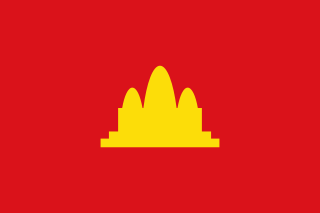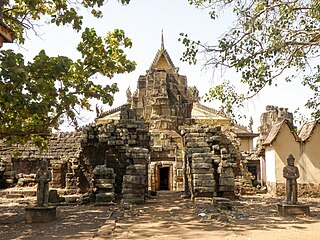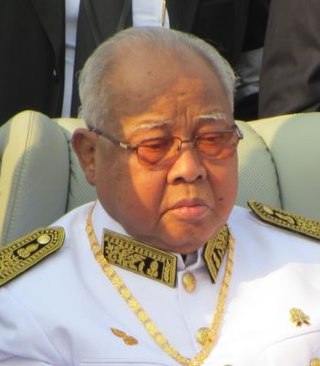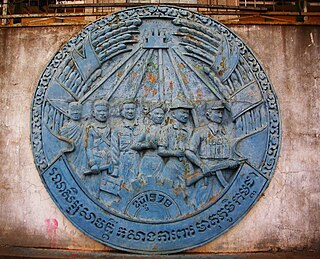
The Khmer Rouge is the name that was popularly given to members of the Communist Party of Kampuchea (CPK) and by extension to the Democratic Kampuchea through which the CPK ruled Cambodia between 1975 and 1979. The name was coined in the 1960s by Norodom Sihanouk to describe his country's heterogeneous, communist-led dissidents, with whom he allied after the 1970 Cambodian coup d'état.

Pol Pot was a Cambodian revolutionary and politician who was the dictator of communist Cambodia from 1976 until his overthrow in 1979. He oversaw mass atrocities and is widely believed to be one of the most brutal despots in modern world history. Ideologically a Maoist and a Khmer ethnonationalist, Pot was a leader of Cambodia's Communist movement, known as the Khmer Rouge, from 1963 to 1997. He served as General Secretary of the Communist Party of Kampuchea from 1963 to 1981, during which Cambodia was converted into a one-party state. Between 1975 and 1979, Pot perpetrated the Cambodian genocide, in which an estimated 1.5–2 million people died—approximately one-quarter of the country's pre-genocide population. In December 1978, Vietnam invaded Cambodia to remove the Khmer Rouge from power. Within two weeks, Vietnamese forces occupied most of the country, ending the genocide and establishing a new Cambodian government, with the Khmer Rouge restricted to the rural hinterlands in the western part of the country.

After decades of conflict, Cambodia's modern era began in 1993 with the restoration of the monarchy and end of the United Nations Transitional Authority after general elections were held. Since 1993, the Cambodian People's Party have consistently been in government, and consolidated power in a 1997 coup d'état. Hun Sen was prime minister until transfer of power to his son, Hun Manet, in 2023.

The Kingdom of Cambodia, also known as the First Kingdom of Cambodia, and commonly referred to as the Sangkum period, refers to Norodom Sihanouk's first administration of Cambodia, lasting from the country's independence from France in 1953 to a military coup d'état in 1970. Sihanouk continues to be one of the most controversial figures in Southeast Asia's turbulent and often tragic postwar history. From 1955 until 1970, Sihanouk's Sangkum was the sole legal party in Cambodia.

The National United Front for an Independent, Neutral, Peaceful and Cooperative Cambodia, commonly referred to as FUNCINPEC, is a royalist political party in Cambodia. Founded in 1981 by Norodom Sihanouk, it began as a resistance movement against the People's Republic of Kampuchea (PRK) government. In 1982, it formed a resistance pact with the Coalition Government of Democratic Kampuchea (CGDK), together with the Khmer People's National Liberation Front (KPNLF) and the Khmer Rouge. It became a political party in 1992.

Kampong Cham is a province of Cambodia located on the central lowlands of the Mekong River. It borders the provinces of Kampong Chhnang to the west, Kampong Thom and Kratié to the north, Tboung Khmum to the east, and Prey Veng and Kandal to the south. Kampong Cham was officially divided into two provinces on 31 December 2013 in what was seen by many as a political move by the ruling party. All land west of the Mekong remained Kampong Cham while land east of the river became Tbong Khmum province. Prior to this division, Kampong Cham extended eastward to the international border with Vietnam, was the eleventh largest province in Cambodia, and with a population of 1,680,694, was the most populous province in Cambodia. Its capital and largest city is Kampong Cham.

Chea Sim was a Cambodian politician. He was President of the Cambodian People's Party from 1991 to 2015, President of the National Assembly of Cambodia from 1981 to 1998 and President of the Senate from 1999 to 2015. His official title was Samdech Akka Moha Thamma Pothisal Chea Sim.

Heng Samrin is a Cambodian politician who served as the President of the National Assembly of Cambodia (2006–2023). Between 1979 and 1992, he was the de facto leader of the Hanoi-backed People's Republic of Kampuchea (1979–1989) and State of Cambodia (1989–1992) and General Secretary of the Kampuchean People's Revolutionary Party (1981–1991). He has been a member of Parliament since 14 June 1993. He is the oldest member of parliament, and the longest-serving president of the National Assembly in history. His honorary title is "Samdech Akka Moha Ponhea Chakrei Heng Samrin".

The Cambodian–Vietnamese War was an armed conflict between Democratic Kampuchea, controlled by Pol Pot's Khmer Rouge, and the Socialist Republic of Vietnam. The war began with repeated attacks by the Kampuchea Revolutionary Army on the southwestern border of Vietnam, particularly the Ba Chúc massacre which resulted in the deaths of over 3,000 Vietnamese civilians. On 23 December 1978, 10 out of 19 of the Khmer Rouge's military divisions opened fire along the border with Vietnam with the goal of invading the Vietnamese provinces of Đồng Tháp, An Giang and Kiên Giang. On 25 December 1978, Vietnam launched a full-scale invasion of Kampuchea, occupying the country in two weeks and removing the government of the Communist Party of Kampuchea from power. In doing so, Vietnam put an ultimate stop to the Cambodian genocide, which had most likely killed between 1.2 million and 2.8 million people—or between 13 and 30 percent of the country's population. On 7 January 1979, the Vietnamese captured Phnom Penh, which forced Pol Pot and the Khmer Rouge to retreat back into the jungle near the border with Thailand.

Nuon Chea, also known as Long Bunruot or Rungloet Laodi, was a Cambodian communist politician and revolutionary who was the chief ideologist of the Khmer Rouge. He also briefly served as acting Prime Minister of Democratic Kampuchea. He was commonly known as "Brother Number Two", as he was second-in-command to Khmer Rouge leader Pol Pot, General Secretary of the Party, during the Cambodian genocide of 1975–1979. In 2014, Nuon Chea received a life sentence for crimes against humanity, alongside another top-tier Khmer Rouge leader, Khieu Samphan, and a further trial convicted him of genocide in 2018. These life sentences were merged into a single life sentence by the Trial Chamber on 16 November 2018. He died while serving his sentence in 2019.

Sar Kheng is a Cambodian politician. He is the vice president of the ruling Cambodian People's Party and served as Minister of the Interior and deputy prime minister from 1992 to 2023. He also represents the province of Battambang in the Cambodian Parliament. Kheng has been the Minister of the Interior since 1992. Until March 2006, he shared the position with FUNCINPEC party member You Hockry as co-Ministers of the Interior, but then became sole interior minister in a cabinet reshuffle as FUNCINPEC ended its coalition with the CPP. He left office as interior minister in 2023 and was succeeded by his son, Sar Sokha.
Chan Sy, also spelt Chan Si, was a Cambodian politician who served as the Prime Minister of the People's Republic of Kampuchea from 1982 until his death in 1984.
Pen Sovan was a Cambodian politician and revolutionary who served as the Prime Minister of the Hanoi-backed People's Republic of Cambodia from 27 June 1979 to 5 December 1981. He also served as General Secretary of the Cambodia People's Revolutionary Party (CPRP) from 1979 to 1981. He was arrested and removed from office in December 1981 by the Vietnamese for irritating Lê Đức Thọ, the chief adviser to the PRK government. He was imprisoned in Vietnam until January 1992.

The People's Republic of Kampuchea (PRK) was a partially recognised state in Southeast Asia which existed from 1979 to 1989. It was a satellite state of Vietnam, founded in Cambodia by the Vietnamese-backed Kampuchean United Front for National Salvation, a group of Cambodian communists who were dissatisfied with the Khmer Rouge due to its oppressive rule and defected from it after the overthrow of Democratic Kampuchea, Pol Pot's government. Brought about by an invasion from Vietnam, which routed the Khmer Rouge armies, it had Vietnam and the Soviet Union as its main allies.

The Kampuchean United Front for National Salvation, often simply referred to as Salvation Front, was the nucleus of a new Cambodian regime that would topple the Khmer Rouge and later establish the People's Republic of Kampuchea (PRK).

General elections were held in Cambodia on 1 May 1981 and marked the establishment of the new, Vietnamese-backed, state of the People's Republic of Kampuchea (PRK). The Kampuchean People's Revolutionary Party was the only party to contest the election, and won all 117 seats. Voter turnout was reported to be 97.8%.

The Communist Party of Kampuchea (CPK), also known as the Khmer Communist Party, was a communist party in Cambodia. Its leader was Pol Pot, and its members were generally known as the Khmer Rouge. Originally founded in 1951, the party was split into pro-Chinese and pro-Soviet factions as a result of the Sino–Soviet split with the former being the Pol Pot faction, and the latter adopting a more revisionist approach to Marxism. As such, it claimed that 30 September 1960 was its founding date; it was named the Workers' Party of Kampuchea before it was renamed the Communist Party in 1966.

Say Phouthang was a Cambodian politician and a leader during the People's Republic of Kampuchea.
Events in the year 2019 in Cambodia.
So Phim was a leader of the Khmer Issarak movement, the third-rank official of the Permanent Bureau and of the Military Bureau of the Central Committee of the Communist Party of Kampuchea, deputy head of the People's National Liberation Armed Forces of Kampuchea, and secretary of East Zone of the Democratic Kampuchea of the Khmer Rouge, until he refused to apply the Cambodian genocide designed by Pol Pot and his comrades, a refusal that led to his own suicide in June 1978.
























